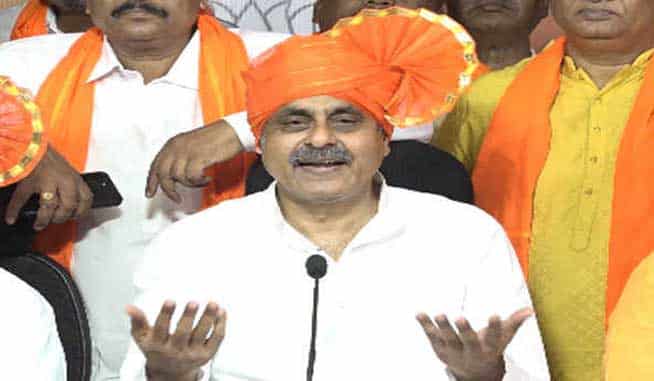Hyderabad BJP Chevella MP Konda Vishweshwar Reddy Defends Waqf Act, Criticizes Congress for Religious Politics
BJP MP Konda Vishweshwar Reddy Accuses Congress of Double Standards, Calls for Accountability in Waqf Act

Hyderabad, India: In a recent address at the BJP’s state headquarters in Nampally, Hyderabad BJP Chevella MP Konda Vishweshwar Reddy Defends Waqf Act, Criticizes Congress for Religious Politics, criticizing the Congress party for allegedly engaging in religious politics. Reddy took aim at the 1995 Waqf Act enacted by the Congress government, claiming it contradicted the secular values enshrined in the Indian Constitution.
Reddy’s remarks come ahead of the proposed Waqf Board Amendment Bill, which is set to be debated during the upcoming winter session of Parliament. The BJP MP shared his perspectives on the Act, the Congress party’s approach to religious politics, and what he described as historical encroachments in his Chevella constituency.
Hyderabad BJP Chevella MP Konda Vishweshwar Reddy Defends Waqf Act, Criticizes Congress for Religious Politics: A Controversial Legacy
Reddy began by discussing the 1995 Waqf Act, a legislation introduced by the Congress government, which he argued grants excessive powers to the Waqf Board, claiming that the board’s powers even surpass those of the Supreme Court. “The Waqf Board has gained an unprecedented level of authority,” Reddy stated, expressing his concerns over how this power is wielded, particularly in land matters.
Historical Encroachments and Aurangzeb’s Legacy
The Chevella MP drew historical parallels, comparing current Waqf practices to those of the Mughal Emperor Aurangzeb, who governed India in the 17th century. According to Reddy, the legacy of Aurangzeb’s policies is evident in land ownership issues today, with centuries-old verbal declarations from the Mughal period allegedly being used to claim land with questionable documentation.
Reddy cited Guttala Begumpet in the Chevella constituency as a prime example of encroachment, where he claimed 90 acres of land have been illegally occupied by the Waqf Board, directly contravening Supreme Court rulings. He alleged that such encroachments are part of a broader misuse of the Waqf Act, facilitated by fraudulent practices that exploit historical ambiguities.
Hyderabad BJP Chevella MP Konda Vishweshwar Reddy Defends Waqf Act, Criticizes Congress for Religious Politics the Role of the Waqf Board in Land Disputes
Konda Vishweshwar Reddy highlighted the complexities of Waqf Board operations in India, which differ significantly from practices in Muslim-majority nations, where the government oversees religious land holdings rather than religious authorities. According to Reddy, this discrepancy has created a situation where private interests in India can use Waqf Board provisions to secure property that should otherwise belong to the public.
Reddy’s criticisms of the Waqf Act were directed not at the Muslim community but at what he perceives as the Act’s misapplication in India. He clarified that the upcoming Waqf Board Amendment Bill aims to address issues of mismanagement and misuse within Waqf properties, which he claims can help prevent further encroachments and illegal land grabs.
Criticism of Congress: Allegations of Religious Politics
During his address, Reddy accused the Congress party of exploiting religious politics for electoral gain. He alleged that the party selectively advocates for the rights of religious minorities as a strategy to attract votes, but that these efforts are insincere and fail to genuinely uplift those communities.
Double Standards in Political Representation
Reddy referenced the Rajiv Gandhi Charitable Trust Board, noting its lack of representation from Backward Classes (BCs) and Dalits, despite Congress’s public emphasis on inclusivity and support for marginalized communities. He suggested that this imbalance reflects the Congress party’s double standards and questioned their dedication to the communities they claim to represent.
According to Reddy, Congress’s inconsistent stance on religious and minority issues only serves to divide the population, undermining the secular foundations of India. He emphasized the need for political unity and integrity over what he described as vote-bank politics.
Proposed Waqf Board Amendment Bill: Clarifying Intentions
In response to concerns from various communities, Reddy clarified the intentions behind the upcoming Waqf Board Amendment Bill. He assured that the amendment is not targeted against any particular religious group but is focused on addressing the alleged misuse of Waqf properties.
The BJP MP argued that reforms are essential to preserve the integrity of Waqf properties and ensure they are used responsibly. He reiterated that mismanagement within the Waqf Board is a pressing issue and that the proposed legislation seeks to bring accountability and transparency to Waqf property administration.
Conclusion: The Call for Secular Governance
Reddy’s address underscored his broader concern with what he sees as a pattern of religious and vote-bank politics, which he believes endangers India’s secular identity. The BJP MP argued that any government that prioritizes short-term electoral gains over national interests is compromising the country’s unity.
Key Takeaways from Reddy’s Address:
- Criticism of the Waqf Act: Reddy claims the Waqf Act grants the Waqf Board excessive powers and enables land encroachment, drawing a parallel with the legacy of Aurangzeb’s policies.
- Land Disputes in Chevella: He highlighted cases of land allegedly encroached by the Waqf Board in areas like Guttala Begumpet, where 90 acres are said to be illegally occupied.
- Congress’s Religious Politics: Reddy accused Congress of religious politics, citing inconsistencies such as the lack of representation for BCs and Dalits in the Rajiv Gandhi Charitable Trust Board.
- Proposed Amendment: The forthcoming Waqf Board Amendment Bill aims to prevent misuse of Waqf properties, with the intent to improve transparency and accountability.
